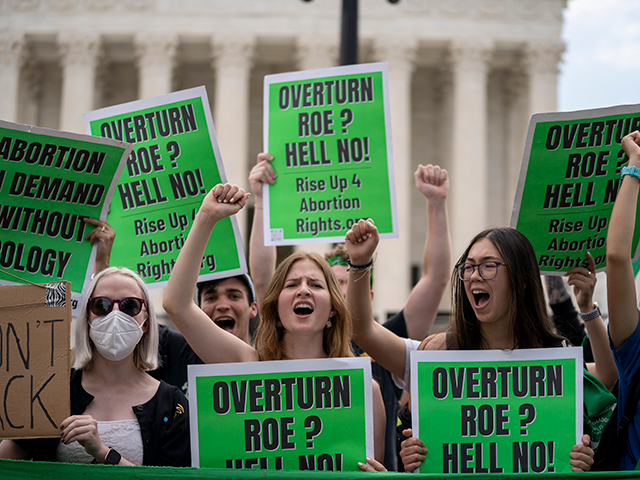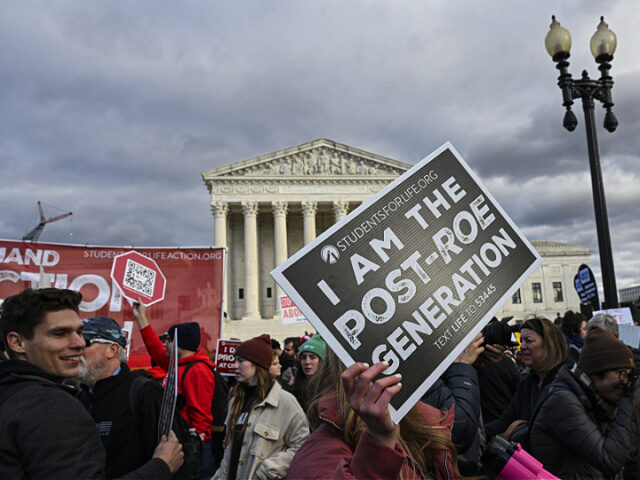A majority of Americans support the Supreme Court’s Dobbs decision, which overruled Roe v. Wade and returned the issue of abortion to individual states, a new Rasmussen Reports poll found.
A little over one year after the Supreme Court ruled in Dobbs v. Jackson Women’s Health Organization, 52 percent of likely U.S. voters say they approve of the decision, including 37 percent who “strongly approve.” Forty-four percent of respondents disapprove of the decision, including 36 percent who “strongly disapprove.”
Rasmussen framed the question as: “Last year, the Supreme Court overturned the 1973 Roe v. Wade decision, so that each state can now determine its own laws regarding abortion. Do you approve or disapprove of the court overturning Roe v. Wade?” When the pollster previously asked Americans this question, 50 percent said they approved of the ruling.

Abortion-rights protesters regroup and protest following Supreme Court’s decision to overturn Roe v. Wade in Washington, Friday, June 24, 2022. (AP Photo/Gemunu Amarasinghe)
Attitudes toward the Dobbs decision vary strongly by political party.
“Among Republican voters, 72 percent approve of the Supreme Court’s decision overturning Roe v. Wade and 26% disapprove. Sixty-three percent (63 percent) of Democrats disapprove of the Supreme Court abortion ruling, but 34 percent approve,” according to the poll report. “Voters not affiliated with either major party are more closely divided, with 51 percent approving the court’s decision returning abortion to states and 44 percent disapproving.”
A strong majority of likely voters (77 percent) believe abortion will be an important issue in the 2024 presidential election, including roughly half (49 percent) who think it will be “very important,” the poll found. Democrats (85 percent) are more likely than Republicans (73 percent) and unaffiliated voters (69 percent) to say that abortion will be at least somewhat important in 2024. Sixty-three percent of Democrats say abortion will be a “very important” issue.
Unsurprisingly, pro-abortion voters are more likely to believe abortion will be important in 2024 than voters who support the Supreme Court’s decision.
“Among voters who Strongly Disapprove of the court overturning Roe v. Wade, 79 percent believe the issue of abortion rights will be Very Important in the 2024 presidential election, compared to just 36 percent of those who Strongly Approve of last year’s Supreme Court ruling,” according to the poll report.

Pro-life activists celebrate the decision overturning the controversial 1973 Roe v. Wade abortion decision outside the U.S. Supreme Court on June 24, 2022, in Washington, DC. (OLIVIER DOULIERY/AFP via Getty Images)
By sex, men (59 percent) are more likely than women (46 percent) to at least somewhat approve of the Dobbs decision. Women (84 percent) are also more likely than men (70 percent) to think abortion will be at least somewhat important during the 2024 presidential election.
The Rasmussen Reports poll is more favorable to the Supreme Court’s Dobbs decision than other polls on the topic released this June. An NBC News poll published on June 22 found that 61 percent of respondents oppose the reversal of Roe v. Wade. An NPR/PBS NewsHour/Marist poll released the same week found that 57 percent oppose the Supreme Court’s overturning of Roe.
The Rasmussen Reports survey of 1,051 likely U.S. voters was conducted between June 25-27, 2023. The margin of sampling error is ±3 percentage points with a 95 percent level of confidence.

COMMENTS
Please let us know if you're having issues with commenting.